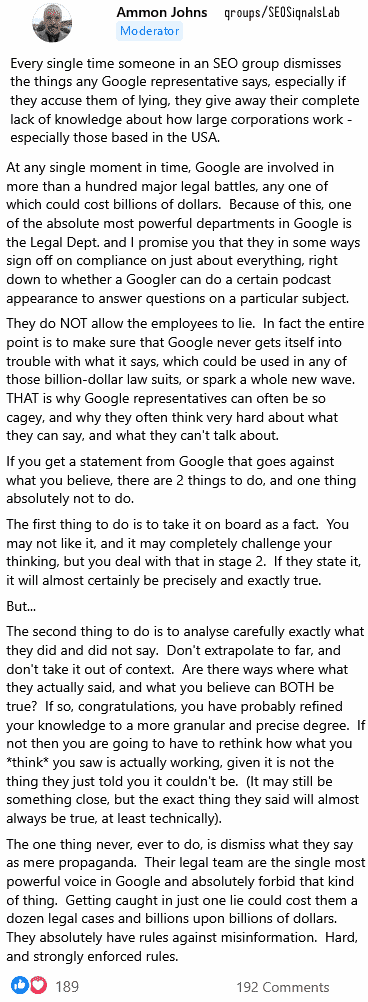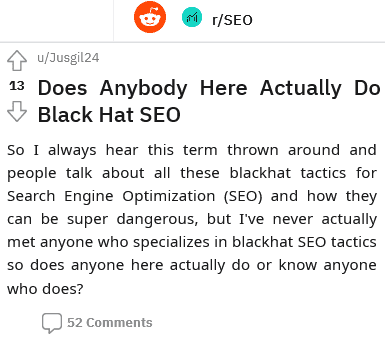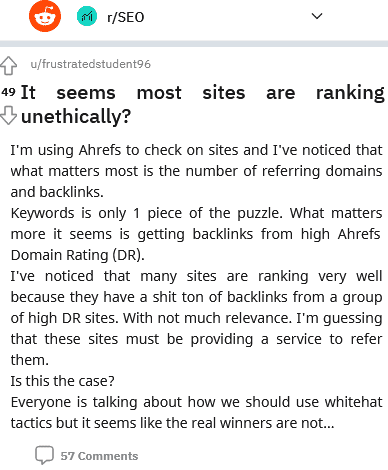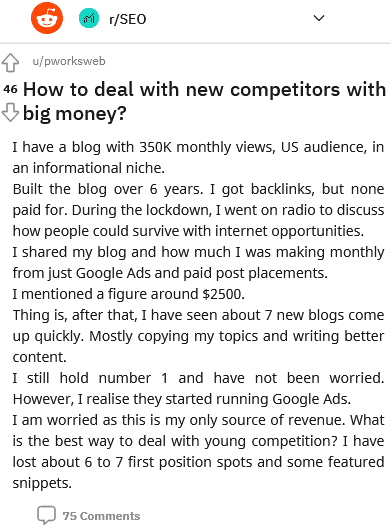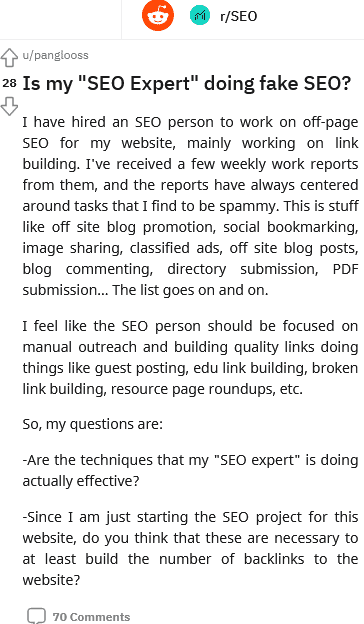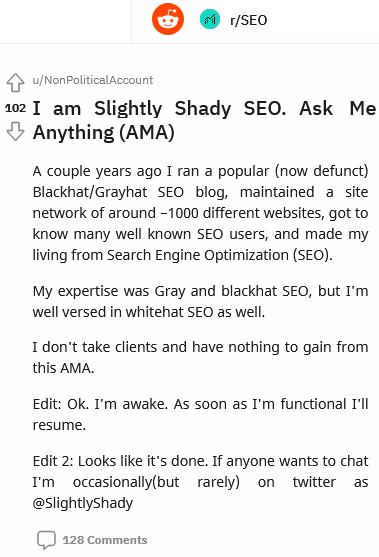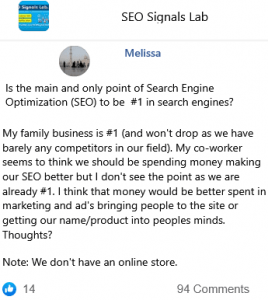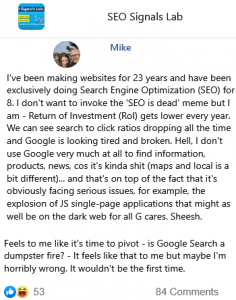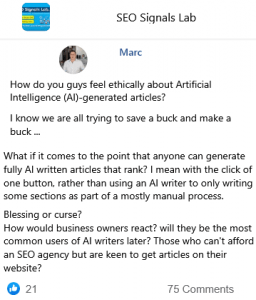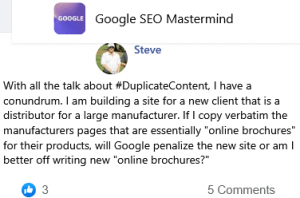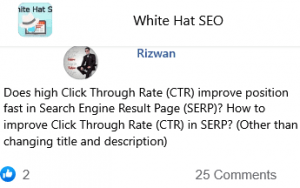Every single time someone in an SEO group dismisses the things any Google representative says, especially if they accuse them of lying, they give away their complete lack of knowledge about how large corporations work – especially those based in the USA.
At any single moment in time, Google are involved in more than a hundred major legal battles, any one of which could cost billions of dollars. Because of this, one of the absolute most powerful departments in Google is the Legal Dept. and I promise you that they in some ways sign off on compliance on just about everything, right down to whether a Googler can do a certain podcast appearance to answer questions on a particular subject.
They do NOT allow the employees to lie. In fact the entire point is to make sure that Google never gets itself into trouble with what it says, which could be used in any of those billion-dollar law suits, or spark a whole new wave. THAT is why Google representatives can often be so cagey, and why they often think very hard about what they can say, and what they can't talk about.
If you get a statement from Google that goes against what you believe, there are 2 things to do, and one thing absolutely not to do.
The first thing to do is to take it on board as a fact. You may not like it, and it may completely challenge your thinking, but you deal with that in stage 2. If they state it, it will almost certainly be precisely and exactly true.
But…
The second thing to do is to analyse carefully exactly what they did and did not say. Don't extrapolate to far, and don't take it out of context. Are there ways where what they actually said, and what you believe can BOTH be true? If so, congratulations, you have probably refined your knowledge to a more granular and precise degree. If not then you are going to have to rethink how what you *think* you saw is actually working, given it is not the thing they just told you it couldn't be. (It may still be something close, but the exact thing they said will almost always be true, at least technically).
The one thing never, ever to do, is dismiss what they say as mere propaganda. Their legal team are the single most powerful voice in Google and absolutely forbid that kind of thing. Getting caught in just one lie could cost them a dozen legal cases and billions upon billions of dollars. They absolutely have rules against misinformation. Hard, and strongly enforced rules.
154 👍🏽29 💟189
192 💬🗨
📰👈
Google being a large company with a fancy legal department does not mean they won't lie and do illegal things, it just means they'll get away with it more than likely. Google has more money than a lot of governments, if they want to take the risk, they can and will. This is not to say that everything they do and say is a lie, but don't be naive to think they won't do what's in their best interest, legal or not.
👍🏽4
But that's exactly the point – they always forbid the shady crap to the front-line and grunts and save it for the high levels. The deceptions will be at the huge, political levels, and take all the managing, so the rule on employees is to NEVER say anything there is any doubt over.
I know a lot of people who work for, or have worked for Google. Even before you get through all of the multiple stages of interviews, and there's more than 10 of those, spread over months, you'll have signed NDAs that weigh more than your children.
The pay at Google is awesome, the benefits are exceptional, and that's before the fact that the opportunities are second to none. But it all comes at a high cost, which is that Google demand a LOT of control over what you can say or do, in and outside of working hours.
For just one quick example, during the pandemic, Googlers were not allowed to do any international travel unless it was signed off from above, not even on their own time. If you work for Google, your conduct is regulated on and off the clock. The pay reflects that, but make no mistake about it. It's one reason that many leave even though they'll always tell you how great it was.
They are really, really serious about the fact that it is better to say nothing, or to change the topic, than to lie. EVER.
🤭🤯👍🏽3
Horia » Ammon Johns
This is absolutely true and reminds me of a joke that used to be near and dear to my heart during conference season:
– Would you like to work for Google?
-No, I prefer less rigid structures, with less discipline and fewer restrictions. Like the US Army.
🤭2
Ammon Johns ✍️ 🎓 » Horia
So utterly true! No way I could ever work for Google.
Lane
I still don't believe John Mueller… nothing you say will ever convince me otherwise. He misspeaks, misdirects and mis-informs all too often but he is cagey and wise in how he does this. He should be given the title of "Chief Obfuscator" at Google.
👍🏽12
Then either you really struggle to understand what he has said, or you may need someone to interpret for you.
I've known John since a while before he went to work for Google around 14 years ago and a little change. I have NEVER known him to lie. Not once.
He's said things that have really given me pause, and made me doubt what I just heard, but if he says it, I know that's a FACT, and if I am struggling to reconcile what I think and know with a fact, then it is at my understanding I need to look. Always.
Often it turns out in the second-stage of what I talk about above, there is specific context, and not actually the conflict I was thinking. This often gives me a better, even more precise understanding, and confirms the core of my thinking.
But even for me, if what John states disagrees with my certainties, I need to re-evaluate my certainties. He's that kind of guy. And that is also where there are so few people at Google allowed to talk with us much. It takes a LOT of control and experience to never misspeak.
🤭
Lane
Nah I'm good but thanks
Skaff
You couldn't be more wrong even if you tried. You have these folks on a pedestal and they suppress stuff all the time to go with an agenda that they like. There is true power in being the world's largest search engine, and a real danger when that company skews results based on there views
🤭💟👍🏽9
The best way to supress any information is to avoid the topic entirely and change the subject. Politicians do this all the time, and there is a huge amount of deliberately creating some big loud news to direct attention away from some other event or scandal.
And those are people TRAINED to lie to your face for their entire career.
Google, by contrast, employ only academic types with degrees, many of them quite far on the autism spectrum, who struggle to lie at all. So they are absolutely told never to do it. Change the topic or just say "I can't talk about that". They do that a fair amount, and why not? It's not like we don't know there's a ton they won't talk about.
But what they will not do, and have strict contractual rules forbidding, is to give misinformation. You may well misunderstand, or worse, hear it second hand from someone who misunderstood, or put it out of context. But if they make a statement, they have checked they are allowed to make it.
🤭
Skaff » Ammon Johns
Wrong, my agency has a name similar to gun manufacturers and they have suppressed my name for years. It was only when I talked to Google did they understand I was a digital agency and not a gun manufacturer did they cut the chains. And that was from an employee that made a decision that I was not a gun manufacturer.
Ammon Johns ✍️ 🎓 » Skaff
And did any specific Google rep ever make a statement to you that there was no issue, or did they just give generalised answers that may have mislead you?
I never said that Google tell you everything. They often avoid the question by answering something different but similar so you think you got an answer you didn't. But they don't make a statement that is untrue.
I've known at least one Google rep that got into trouble over things said on a webinar, even though true, because they could be taken out of context too easily.
Skaff » Ammon Johns
And maybe that is the case, but I know first hand that they passed judgment on me and I had to fight them for years before they got it. I wrote about this exact subject this past winter about the dangers from the worlds largest search engine and what they do and do not show.
🤔
Ammon Johns ✍️ 🎓 » Skaff
You have my sympathies, and you are absolutely right. My father always taught me that "To err is human, but if you want a real clusterf*ck you need computers".
Systems are so often designed to work with minimal oversight, even without being on the unprecedented scale of the Internet, that people often cannot see what the system has done wrong, unless they really drill down.
One reason I'm not that worried about being replaced by so-called AI anytime soon.
The good news is that this same thing works for us as often as against. So often it is in being able to outsmart the tool, and the systems of automation, exploit their weaknesses, that SEO is still valid. Not just in the engines at all, but in how someone with a few SEO tools is not going to beat someone with SEO experience, even if both use the same tools. The SEO know when to NOT do what the systems say.
👍🏽
J
complete rubbish – the peeps in the trenches test things before they use them which is why most people laugh at what Google says works and doesnt and what they say they don't look for.
Also with big corporations the left hand doesnt know what the right hands doing 90% of the time.
Also many departments are outsourced to various call centres in other countries
👍🏽6
In regard to ADWords you are 100% correct. I wouldn't trust a word those guys said at all, but they are kept very separate to Google proper, not even in the same campuses, and there is almost no interaction at all between the engineering teams and anything business-related. The AdWords guys and the CEOs have different rules. I'm not including those because those are not the guys we ever discuss in groups like this.
The engineering side, and organic side, have a very strong "For the science" focus and belief.
🤭
Tica
You're absolutely right that they avoid lying whenever possible and that all the statements need to be examined from all the possible angles as they may contain some good nuggets.
But you are also greatly exaggerating the power of a simple statement in Court, a statement that can be made to look as being taken out of context, as meaning exactly the opposite or the infinite number of possibilities in between.
👍🏽4
Of course that's true about statements. But remember that often the ones taking them to court ARE governments and the courts themselves. And the cases are always about technical stuff that courts already struggle to understand. SO Google are ultra-careful.
Honestly, it is SCARY how much power and say the legal teams have at Google. I couldn't work there.
👍🏽
Tica » Ammon Johns
The Court system struggles with the most basic cases when one of the parties is set on utterly and shamelessly lying (or working with partial truths, misdirection, intentional delays, etc). So, yes; when a technical case is heard, even or especially if the government is suing, it's a free for all where facts change all the time. The people here are more likely a better judge of technical details than any jury or judges. 🤷♂️
👍🏽
J
My guess is you went to brighton SEO recently and got a deceptive view and perhaps got a bit close to johnM while you were there
🤭👍🏽8
Koszo
Google's algorithm is very complex, I don't think any single person can speak authoritatively on it 🙂
👍🏽18
There's a TON of truth to that. Which is part of the reason that you can find hundreds of instances where Matt Cutts used to say he'd have to check, where Gary or John today still say the same, or say that "to the best of their knowledge…" etc.
👍🏽2
Jester » Ammon Johns
Yes but John M is wrong frequently. I'm not sure why you have such a hard on for him.
👍🏽
Ammon Johns ✍️ 🎓 » Jester
I guess I haven't seen the clear examples you have in mind and are about to share. I'll look forward to seeing it and reconsidering.
Shaun
Wow this is utter rubbish. You need to pay attention more to what Muller says. This group has caught him lying constantly.
🤭👍🏽3
I've known John for 16 years, he's worked for Google only for 14 of them, and I've known you 16 seconds. Guess which one I feel more confident in?
🤭💟👍🏽3
Shaun » Ammon Johns
Not meant to be a personal attack. This is a group the believes in testing not someone's claims.
Ammon Johns ✍️ 🎓 » Shaun
An accusation of 'brainwashing' is 100% a personal attack. That's why I suggest you rephrase HOW you make your point about testing, not whether you make a point about testing.
Shaun » Ammon Johns
Stop pushing you mod status I see you deleted one of your posts. I've also looked at others reactions and some have the same standpoint as I do. Leave it at that we agree to disagree.
Kathy » Shaun
Can you share some of those? If it's constant, I'm assuming I'm not asking much and they are readily available. Not arguing. I actually want to see them for my own educational purposes.
Bogdan
Almost every single answer I see from them (especially Matt and John) have some things in common.
First of all, it almost never answer the question in its broad sense, but on a much narrow sense (or example).
Then, the answer is almost always moved to some example where you can spot some exceptions.
For example, the recent answer John had on AI writing. Is starting clear as crystal – AI writing is spam and 100% against Google guidelines and policies. He's moving then to imply they can't actually catch it, but they learn, they will keep on learning, and so on with the cat and mouse analogy. But how it ends? Is comparing AI writing with translation tools, where the results is ok if we put a bit of human work on it.
Your post, Ammon, was great as always, and I am 100% sure you are right, with no back meanings or exceptions. We have to take as true all they say, then look for what they didn't covered in what they said.
Thank you.
💟👍🏽6
Kang 👑
There are three types of people: people who only think in black and white, people who understand grey shades, and people who see color. Most communication issues are caused by three very different groups attempting to understand or teach other groups.
💟👍🏽30
Shades of grey.. I dunno man, there's just something a little poetic about how it sounds said this way 😂
🤭2
Kang 👑 » Yarro
People who quote "shades of grey" are kind of naughty. I said "grey shades." 😀
🤭4
Yarro » Kang
Ahh… All of a sudden it sounds a little less appealing 😁😂
🤭2
Ammon Johns ✍️ 🎓 » Kang
Only kind of. I worked the adult sectors for a lot of years and all anyone I knew would say about Shades of Grey is that if anyone found that shocking they were probably still married to the first person they'd ever kissed. 😃
🤭4
Thompson
I partially agree, but I think it's important to remember that legal teams manage risk, not truth per-se. If a lie is low-risk they won't necessarily block it.
I think Google spokespeople could lie and it be considered very low risk and acceptable by the legal department:
1) Google is banking on their algorithm never being known, so it would be pretty hard to definitively check if they were lying.
2) Google's algorithm and the web are so huge and complex that many/most statements are probably true in some context or interpretation. Heck, even well-known myths like "Using keywords in your meta descriptions boosts your ranking on Google" are true in certain contexts (using keywords in meta descriptions can boost CTR which would improve your personalized results rankings).
So I'm not convinced that Google's legal department stops their spokespeople from lying. But neither am I convinced that Google's spokespeople knowingly lie. I would guess that Google's #1 priority is not allowing their spokespeople to reveal secrets about their algorithms.
Hence all the vague generalities, statements that align with how Google wants the algorithm to work vs how it actually works, and answers that avoid the real critical issues. The end result is Google makes statements that are often misleading and/or unhelpful…but may or may not be outright lies.
But many people want everything in black and white…it's either the proven truth or a dirty lie. Reality is rather more complex, though. (Which I guess is kinda your point!)
🤭👍🏽3
Google don't have to 'hide' their algorithms. It's simply too big, too complex, has too many layers of processes that interact with each other so that the outcome of one complex algorithm is changing what even feeds into another, never mind what comes out, that nobody knows it all.
Googlers have tools that allow them to query the engine about what factors went into a very specific query or process, but they have to look it up at the time. In advance they can only generalize about what is expected, or how a specific aspect works. The whole interaction is bigger than any one person's experience.
There are literally thousands of scientists working at Google. Every single day they are working on stuff. If you spent the whole day doing none of your own work, and only talking to others about theirs, you still couldn't cover even a fraction of all of those staff, all of those projects.
🤭
Michae
They have this shit down to an absolute science. They don't lie, but they can and do often influence the mass audience into believing shit that's not accurate. Often via omission.
You ever read the Wheel of Time (watching the absolute shit Amazon version doesn't count)?
Aes Sedai can't lie either, but they can certainly twist the situation verbally.
💟👍🏽4
Absolutely. Great books. I was always a massive fan of sci-fi and sci-fantasy (until in recent years reality became more fictional/fantastic).
What they actually say will almost always be true (there are instances where they say "We never use X" and later it turns out that some obscure sub-product of academic search that only indexes patents written by shoemakers uses it for something). Noticing the precise differences between what they say and what you see is how you can really hone in on how something really works, far more than much else.
🤭👍🏽3
Mawji
I've had clients call me up because their AdWords rep told them they'll rank better if they have paid ads. I understand your point but in many cases we've seen things they've said that are false in majority of cases and only ring true in certain circumstances. In this particular case yeah you could argue PPC helps you rank better indirectly because you can increase brand recognition this eventually improve CTR when they see your organic result, which we know is a ranking factor. So what they SAY is technically true indirectly but directly it's a false statement.
Legality is a gray area and Google certainly uses that to their advantage when answering questions in my opinion.
Oh, don't even start me on the BS you'll get from the AdWords side. They aren't even proper Googlers and they know it (which I think is why they so often like to pretend they matter). Literally they are treated as a bolt-on afterthought, not even allowed to mix with the organic or science guys. Separate buildings in most cases, or at corporate HQs, separate floors and told to stay to their areas. 😃
There's a brilliant guy who was a product manager for AdWords, who now runs a very selective agency called Mind's Nebula. Great guy, knows tricks with AdWords that very, very few do. But only ever even met one of the organic side if he was training them in how something worked. Had no real knowledge of the organic side at all, no matter how smart he was. Completely different worlds, kept apart.
Mawji » Ammon Johns
That I believe, I had the pleasure of having an account rep who was actually brilliant at what she did and ended up getting a promotion to be a product manager. She'd never met anyone from organic search either. Her replacement knew less about AdWords than some of my interns 🤦🏾♂️
🤔
Dario
About 5 years ago, I spoke with an extremely well known Google "engineer" at a conference and asked him about his take on PBNs. He legitimately didn't know what I was talking about. Google reps only know white-hat theories, not anything practical. Real world results often conflict with what they say, and that's why many SEO users (including myself) don't put much weight on their announcements.
It is not that they only know white hat stuff, it is that they have their own terminology for tons of stuff that is entirely different to what SEO users have.
Their term for PBNs in link-swapping networks, or just 'link manipulation', and they've never *needed* any other terminology. If you think that the idea of owning a bunch of sites and using them for links didn't happen before blogs were a thing, I promise you you'd be surprised. 😂 Link swaps and link wheels and even the classic 'Hallway Page Cooperative' or Buddy Links systems all predate the very invention of WordPress by a fair bit.
One of the terms of old was 'Link Pockets', for how these stand out in the Link Graph view. A great many PBNs tend to look like these little cul-de-sacs on a map, with their own buildings often around their own roads, but only connected to the greater web in one or two places.
Sometimes we read a few patents and learn the 'official' names for things. Like with 'Temporal Dynamics' (which is how time can be a factor in all sorts of ways, sometimes positive, sometimes negative, and covers all sorts of 'schedules' and time-based behaviour patterns (the day night cycle, days of the week, the weekends, seasons, news, burstiness, etc, etc).
But a lot of the time we see some pattern and give a name for what we think we see, maybe based on how we think it works. We're pretty good at making up our own terminology thereby, such as with 'Fresh Boost' or 'The Sandbox', etc. Some we even make up just to talk about concepts between ourselves and they later get misunderstood and taken as metrics. Domain Authority, for a good example. Google only value links at the link by link, URL by URL level. They have no domain level stuff for anything but penalties.
Keyword Density is another one, because originally, in the mid 90s, this was one of three keyword usage metrics we used together, and meant nothing on its own. The other two were keyword prominence (how close to front-loaded the keywords are in the greater content) and keyword count (the absolute number of occurences)
After all a page with 50 words of which 5 are keywords can be said to have a 10% density, but so can a page of 5,000 words where 500 instances of the keywords appear. Unless you also have count and prominence, the density number has no meaning at all.
I promise you that your Googler would have no trouble at all understanding "a group of affiliated or co-owned sites that exist to manipulate link popularity between their pages". He'd probably tell you their terminology for it. "Oh, you mean link manipulation networks".
Dario » Ammon Johns
As if I shouted "PBN" and walked away. It's bizarre for you to assume we didn't have an in-depth discussion about it — he still didn't know. I was being kind in my first reply. In actuality, Google always has an agenda with webmasters. One of the first was to build their search index via GA, next to build their spam database via disavow, and lately to build their knowledge graph further via schema and GSC. I won't even get into the highly suppressed and manipulated Google SERPs. Google reps are in place to further their agenda and business model, whatever the current flavor might be. But, by your replies here and in general, it sounds like you thoroughly enjoy the Google kool-aid. And, I did too at one point in the early 2000s. Cheers.
Ammon Johns ✍️ 🎓 » Dario
Oh dear. So many misconceptions, errors and outright myths lie just beneath the surface here.
Let's start with the most obvious: GA never has, and never is likely to, contribute to building out their search index in any way whatsoever. This is one of the most basic myths, popular only among those unable to grasp how important clear rather than noisy signals are. Any muppet can manipulate their stats in GA, thus it absolutely cannot be trusted as source of reliable data by anyone but a complete fool.
Google do not use GA data for anything *except* tracking actual user-behaviours across multiple sites and interactions generally, giving them insight into entire sessions in the broad and general sense. But they gain better quality data of the same type from Chrome and most especially from android. GA is so poor by comparison that I half wonder if they'll drop it someday.
Moving on: Disavow was letting webmasters use something Google were already using. One of their long ago updates against link spam was to be able to penalise the links, without penalizing the site itself in SERPs. Effectively, a flag on URLs that said to ignore the links completely. In other words, a Google-side disavow.
We mostly saw this in use in UGC areas of otherwise important sites, back when places like The Guardian, Forbes, and many other top brands were allowing user-submitted content to be on their domains simply to increase the stock of pages they could show ads on.
Forbes in particular lost the ability for any of its links to pass PageRank for quite a while, as did some of the similar publications, which was when they suddenly hastened to start appropriately marking UGC and nofollowing the links so that Google might remove the effective site-wide disavow.
In other words, Disavow files were a fully fleshed out development FROM their spam database, and not vice versa. People in the 'black hat' communities did test (excessively) whether you could trigger spam penalties on other sites by disavowing them from entire PBNs, and nope. The disavow tool came FROM already implemented spam recognition system flagging. Still, at least you were close.
Now, in general, Google employees are there to do a job. For most of them that job is not about misleading people, or even speaking to webmasters, and the official jobs policies are a lot more like the engines of old (Altavista etc) that would rather not talk to webmasters, and regard most SEO as adversarial (again, the official science term for those attempting to manipulate the clean data you work with).
John Mueller is one of the only Googlers I ever knew who was helping webmasters before Google employed him, and carried on in a webmaster help capacity after hire. He works a fair bit on the webmaster tools and dashboards, on passing info back and forth between the users of Google tools (webmasters) and the teams that develop the search console, analytics, and the webmaster help guidelines.
By contrast, Pierre Far who joined Google quite soon after John, and had been at the same SEO forums for some years prior to employment at Google, pretty much stopped interacting with webmasters much once he was working for Google. Pierre was quite heavily involved in the Page Speed stuff though, and did give some guidelines and information about that specifically.
I do get the massive attraction of nice, simplistic conspiracy theories. That all Googlers are somehow a completely different breed to the rest of us, following different rules of behaviour, and they really know everything and just obfuscate. The trouble with that is that it is horsepucky. There are many ex-Googlers in the SEO community, many of whom worked in search quality, or even worked in the spam teams, and I compete with them very well and amicably thanks. They don't have all the secrets. In fact their one major advantage is that they know all the bullshine for what it is and focus on doing actual SEO work.
Truslow 🎓 » Ammon Johns
I've been betting for a while now that Google is slowly phasing out their GA style tracking. In the olden days, it made sense – but now with the users themselves possessing Google things that can track them – there's no need for keeping the vastly inferior methods of tracking them where they land. Why do that when you can just stay with most every user through their entire life.
My bet is 5-7 years and Analytics is a thing of the past.
Ammon Johns ✍️ 🎓 » Truslow
One of the biggest conversation pieces going on over and over around BrightonSEO was, of course, GA4 and how useless it is.
Now, you can do a lot with it still as a base platform, and then use Data Studio, or even simply Google Sheets to get a meaningful, useful report out of it, but that's a lot more work than most people were ever needing or willing to do before.
Fact is that if you want to keep using GA going forward, it is ALL about the roll-your-own dashboard, the custom tracking parameters, and the javascript or other interactive inputs. At which point you might just as easily be rolling your own flavour of analytics from scratch in the first place and shutting Google out of the loop.
Truslow 🎓
Yep. Those facts exactly (indicators, really) is what took this as something I'd been speculating on for a while (since the Cookieless Web discussions started) and turned it into something I'd be willing to wager several dollars upon. The usefulness to Google to have us tracking people is all but gone and, with this new product being more of a framework than an actual tool – the tide is turning in this certain way more certainly.
We're putting together a list of potential replacement tools this month and we'll be testing each one out on a different client site over the following 3-4 months to see which ones are most useful. From there, I'm hoping we can find something we really like and get that put on everyone by July or August so we have a year worth of collected data by the time analytics runs out. Most of the ones we're looking at will let us (in one way or another) import the UA data – but it's nice to have a year worth of native data since it often contains different elements that we may not be able to get from an import from UA.
We'll see how that goes. lol
Ammon Johns ✍️ 🎓 » Truslow
Coincidentally, it was at the exact same event, BrightonSEO, that I gave a talk 8 years earlier about moving away from Google Analytics.
The slideshow itself has all the main points, though a little 'bare bones' without my actual presentation and stories around it.
However there was a rather more detailed write-up of the key points and how someone had taken them away and run with them.
💟
Dang
Corporations lie, true. But what Ammon Johns is saying is true. Of course corporations lie, or else we wouldn't need the DOJ to go after them, the SEC etc. Google or Alphabet Inc. is a publicly traded company. Everything they say and do is highly scrutinized.
Does Google lie? Hell yes. Does it make sense for them to appoint a single spokesperson to publicly answer questions with the express directive to lie to them? That's beyond stupid. They derive zero benefit from doing so and a huge amount of risk. What Mueller does sometimes is engage is semantics, and obfuscation, but most of the time … it's SEO users not even really trying to understand what he says. A lot of his statements are answers to specific questions. So people take what he says, without the context of the question, and say "oh he's so wrong." Here is one example:
When asked if total referring domain matters more, or total backlinks, Mueller says "we don't look at it that way." In the statement, Mueller says "total number is essentially irrelevant"
And the YouTuber goes on to misinterpret this and say "Muller says total number of backlinks is irrelevant is he lying?"
But if you stop to think about what he is saying, he's saying, your total number is irrelevant because we can ignore 1, 2, or all of your backlinks. What is important, and he says so, is if the link is relevant. So total number of "relevant" backlinks is important. I mean, he says it right there in his example.
But many who can't parse this language walk away thinking he is lying.
💟
Plus one of the backlinks might be worth more than all of the others combined.
You picked a great example because Google have actually published TONS of papers, patents, and other information about PageRank, and how it is completely page-specific. There is NOTHING about domains at all in how PageRank works, and PageRank is still the primary link weighting metric.
PageRank doesn't count domains. It doesn't need to, because doing it at the page by page level is far more detailed, more granular, and in all ways better.
And despite this being known for literal decades, despite literally thousands of times it has been explained in SEO groups that NONE of the positive ranking signals around links care about domains, and despite hundreds of officially filed papers, people still ignore every bit of information to ask really stupid questions the answer has already been published to a thousand times.
Ree
Great post, Ammon. I love that recommendation to "analyse carefully exactly what they did and did not say" – I think about that a lot. And they definitely make it clear they have strong policies against certain information. 😁
There's been a fair few times when I've seen some statement doing the rounds and immediately thought "That's not right". And every single time it is something specific, when I go and look at the details, the original quote in the original context, the statement turns out to be right. But you really need to get ultra-specific, because whenever they give non-general answers, they at Google also have to be ultra-specific.
That's not just John, but also Paul, Martin, Gary, and others too.
A few years back, I got invited to do some panel shows with a Senior Search Quality Analyst, Andrey Lipattsev, for a series on YouTube done by Anton Shulke. I can tell you that there were a lot of times it was very hard work, and rather frustrating, to have those talks, because you really do have to run everything through your mind a half dozen times for the exact specifics of what was said, and not said.
In those chats were some real gems and nuggets, real insights into the back-end workings of Google, but, Boy, did you have to pay attention to separate them out. Hopefully, all our brain-sweat to dig through to the nuggets made it easier for those not having to also do the interrogation, but it was seriously hard work at times.
💟2
Chris Edwards 🎓 » Ammon Johns
Have to agree, the answers given are so often an answer, but not a direct answer to the question asked, it's a 'better understanding' answer meant to create a first step to understanding rather than a straight yes or no answer.
📰👈
A Proposal of The modern SEO Theory: Redefining Popularity and EAT, Content Quality and Technical SEO
Google Love any Consistent News Sites: How the Hell Does Forbes Still Rank So Well?
When You Think Sceptics and Something Suspicious About SEO, Well! My Friend, You Are Learning Real SEO!
Which one is Better, 10 Sites or 1 Site Earn the Same Total Amount a Month?
8 SEO Tips: Voice Search Opt, EAT, Featured Snippet, NLP instead of LSI, Quality Backlinks, Local Search Listings, UX, Schema Markup
40 KPIs Mixed Questions to Ask Someone Interviewing for an SEO Job?
37 SEO Best Practices Involving Social Media, Silo, SEO Plugins, Schema, Video Submission, Keyword Research, SEO Audit
24 Fav Tools for Rank Tracking, Link Building, Technical SEO, Keyword Research, Backlink analysis
6 Tips for if You Get a Local SEO Client Using GMB
